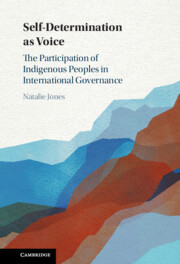Book contents
- Self-Determination as Voice
- Self-Determination as Voice
- Copyright page
- Dedication
- Contents
- Acknowledgements
- Table of Cases
- Table of Treaties
- Abbreviations
- Introduction
- 1 Participation in International Governance and the Logic of Self-Determination
- 2 Finding Support for Indigenous Peoples’ Participation in the Sources of International Law
- 3 The Proliferation of Indigenous Peoples’ Participation, 1982–2007
- 4 Emerging Legal Status? Participation of Indigenous Peoples, 2007–2022
- 5 Conclusion
- Bibliography
- Index
5 - Conclusion
New Epoch, Old Stones
Published online by Cambridge University Press: 04 January 2024
- Self-Determination as Voice
- Self-Determination as Voice
- Copyright page
- Dedication
- Contents
- Acknowledgements
- Table of Cases
- Table of Treaties
- Abbreviations
- Introduction
- 1 Participation in International Governance and the Logic of Self-Determination
- 2 Finding Support for Indigenous Peoples’ Participation in the Sources of International Law
- 3 The Proliferation of Indigenous Peoples’ Participation, 1982–2007
- 4 Emerging Legal Status? Participation of Indigenous Peoples, 2007–2022
- 5 Conclusion
- Bibliography
- Index
Summary
Chapter 5, ‘New Epoch, Old Stones?’, is the conclusion of the book. It first synthesizes the findings of the examination of practice conducted throughout Chapters 3 and 4, setting out a statement of the scope and content of the emerging rule in (European) international law. Then, by reference to the persistent limitations to participation, it raises questions about what and who the proliferation of mechanisms for Indigenous participation – and the emergence of a legal standard in custom – serves. The chapter engages with the work of Indigenous political theorists to question whether current mechanisms for Indigenous participation in global governance may in part function to legitimize and protect (neo)colonial global economic and political structures. This does not invalidate the conclusion that the right is part of customary international law, nor is it to say that the project of Indigenous peoples’ participation in international governance is not necessarily worth pursuing. Rather, it serves to highlight the limitations of the right, the contingencies of its application, and ultimately to gesture at a space to develop alternative possibilities for Indigenous internationalism and sovereignty.
Keywords
- Type
- Chapter
- Information
- Self-Determination as VoiceThe Participation of Indigenous Peoples in International Governance, pp. 258 - 272Publisher: Cambridge University PressPrint publication year: 2024

